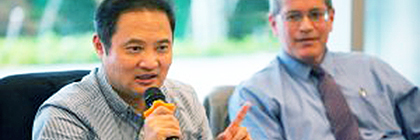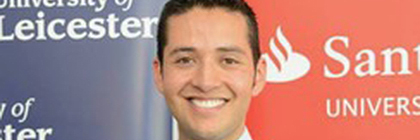Student demographic data collected by the Ontario Ministry of Education should be leveraged to enhance student success through equity measures, a new report out of York University suggests.

The report, commissioned by the Ontario Ministry of Education and co-authored by York University Faculty of Education Professor Carl James, recommends that race-related data be collected and used to identify and address equity barriers.
The study, “Unlocking Student Potential Through Data,” is the outcome of a joint project that explores new ways to support “Achieving Excellence,” Ontario’s vision for publicly funded education.
“The Ministry of Education has always been committed to evidence-based, informed decisions. ‘Unlocking Student Potential Through Data’ is another study that will help inform our path forward,” said Bruce Rodrigues, deputy minister, Ministry of Education.
Together, the Ministry of Education, Ontario’s Anti-Racism Directorate, the Ministry of Children & Youth Services, and the Toronto District School Board worked with York’s Faculty of Education to produce the report.
The report indicates that the ministry could better utilize the existing web-based Ontario School Information System (OnSIS) and other sources, and additionally makes 47 recommendations which could be implemented with the collection of additional data and analyses to allow for more informed decision-making.
“The Faculty of Education is pleased to have collaborated with the Ministry of Education in this important work,” said Lyndon Martin, dean, Faculty of Education at York University. “The Faculty has a long-standing commitment to social justice and the final report contributes to this and to the enhancement of public education in Ontario for all students.”
According to the report, the Ministry and school boards can create more relevant processes and programs to ensure children arrive at school ready to learn; have access to teaching and learning opportunities in elementary and secondary school that are inclusive and provide them with strong skills in literacy, numeracy and science; and increase the quality and accessibility of postsecondary education and adult learning and skills development.
James, who is also the Jean Augustine Chair in Education, Community and Diaspora, said that gathering more of the relevant demographic and perceptual data from various sources of both students and educators will be important to analyze and address equity issues in the education system.
“For example, issues like student streaming and systemic racism can be addressed more efficiently, and new programs for professional development and pre-service training for teachers and education staff can be created based on analyzing such data,” he said, adding that the data must be separated and analyzed as individual racial groups, to identify and address issues unique to each group.
The report cites several other key concerns facing the education system, such as social inequality; gaps in addressing educational programming for students with special education needs; providing inclusive space for Indigenous students; relationships across the sector; school climate; and student discipline.
“We hope this report will serve as a tool to guide the ministry’s data directions to create and implement initiatives that enable greater collaboration between ministries, the public sector and school boards,” said Donna Quan, lead auther of the study and senior advisor, Student and Education Data, Ministry of Education. “This will ensure improved success for all Ontario students, from early years to postsecondary.”






 Leah Keating – Department of Psychology
Leah Keating – Department of Psychology Melanie McBride – Faculty of Education
Melanie McBride – Faculty of Education Emily McGiffin – Faculty of Environmental Studies
Emily McGiffin – Faculty of Environmental Studies Rehan Siddiqui – Department of Earth & Space Science & Engineering
Rehan Siddiqui – Department of Earth & Space Science & Engineering Hyekyoung Sung – Department of Biology
Hyekyoung Sung – Department of Biology













 York University PhD candidate Mario Guerrero is the recipient of a fellowship of $15,000 from Freie University in Berlin in collaboration with York International.
York University PhD candidate Mario Guerrero is the recipient of a fellowship of $15,000 from Freie University in Berlin in collaboration with York International. Stacey Bliss, a second-year PhD candidate at York University in the Faculty of Education, has earned the 2017 Kenneth and Sylvia Marantz Fellowship for Picturebook Research, which encourages and engages scholars from around the world with the resources of the
Stacey Bliss, a second-year PhD candidate at York University in the Faculty of Education, has earned the 2017 Kenneth and Sylvia Marantz Fellowship for Picturebook Research, which encourages and engages scholars from around the world with the resources of the  She drew from her initial inspiration and analysis from Kyo Maclear (Faculty of Education PhD candidate) and Katty Maurey’s (2015) contemporary picture book
She drew from her initial inspiration and analysis from Kyo Maclear (Faculty of Education PhD candidate) and Katty Maurey’s (2015) contemporary picture book